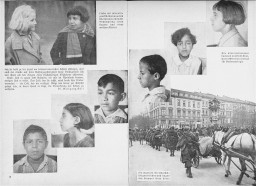You searched for: ������������A
<< Previous | Displaying results 6441-6450 of 6707 for "������������A" | Next >>
-
Portrait of Żegota member Andrzej Klimowicz
PhotoWartime portrait of Andrzej Klimowicz, Poland. Andrzej Klimowicz (1918–1996) aided and rescued Jews in Warsaw throughout the duration of the German occupation of Poland. He eventually became a member of the Council for Aid to Jews (codenamed “Żegota”), a clandestine organization that coordinated efforts to save Jews from Nazi persecution and murder. Under the auspices of Żegota, Andrzej played a role in providing Jews in Warsaw with forged identity papers and hiding places outside the walls of the…
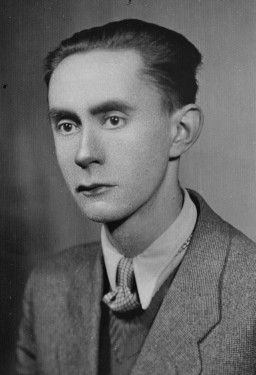
-
Eva Justin interviews a Romani woman interned in a "Gypsy camp"
PhotoA color photograph of Eva Justin interviewing a Romani woman interned in a "Gypsy camp." Vienna, Austria, 1940. During the Nazi era, Dr. Robert Ritter was a leading authority on the racial classification of people pejoratively labeled “Zigeuner” (“Gypsies”). Ritter’s research was in a field called eugenics, or what the Nazis called “racial hygiene.” Ritter worked with a small team of racial hygienists. Among them were Eva Justin and Sophie Ehrhardt. Most of the people whom Ritter studied and…
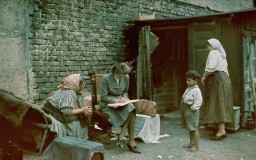
-
Portrait of Żegota member Irena Sendler
PhotoPortrait of Irena Sendler in Warsaw, Poland, circa 1939. Irena Sendler (1910–2008) was a member of the Council for Aid to Jews, codenamed “Żegota.” Żegota was a clandestine rescue organization of Poles and Jews in German-occupied Poland. Supported by the Polish government-in-exile, Żegota coordinated efforts to save Jews from Nazi persecution and murder. It operated from 1942 to 1945. Irena Sendler (Sendlerowa) was working as a social worker in Warsaw when World War II broke out in 1939. After…
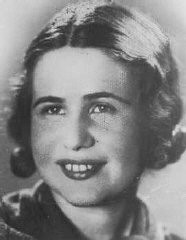
-
Portrait of Żegota co-founder Władysław Bartoszewski
PhotoPortrait of Władysław Bartoszewski, Poland, unknown date. Władysław Bartoszewski (1922–2015) was a co-founder and member of the Council for Aid to Jews, codenamed “Żegota.” Żegota was a clandestine rescue organization of Poles and Jews in German-occupied Poland. Supported by the Polish government-in-exile, Żegota coordinated efforts to save Jews from Nazi persecution and murder. It operated from 1942 to 1945. After World War II broke out in September 1939, Władysław worked as a janitor…
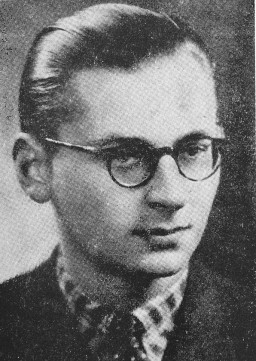
-
People crowded around an antisemitic "Pesti Ujság" newspaper display
PhotoVisitors view the exhibition of the Arrow Cross newspaper, Pesti Ujság, at the International Fair in Budapest. The headline reads: "For a Hungary without Jews." Budapest, Hungary, approximately 1941-1942. The Arrow Cross was Hungary's largest fascist political movement after 1935. In the 1939 parliamentary elections it won over 20% of the vote and had more than 250,000 members. Its ideology was ultra-nationalistic and fiercely antisemitic. The Arrow Cross viewed Jews as an "anti-national" "race"…
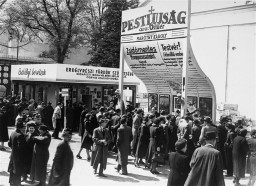
-
Election officers in the Democratic Republic of the Congo
PhotoElection officers count votes late into the night after the second round of the 2006 presidential and provincial elections in Bunia, Ituri, Democratic Republic of the Congo.
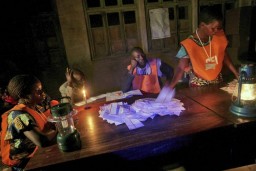
-
The UN Diplomatic Conference on the establishment of an International Criminal Court
PhotoThe United Nations Diplomatic Conference of Plenipotentiaries on the Establishment of an International Criminal Court opened a five week session on June 15, 1998, in Rome, Italy.
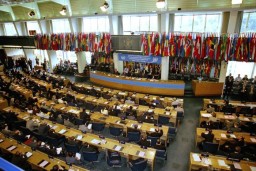
-
A group of schoolchildren in South Sudan
PhotoSchoolchildren wait in anticipation for the arrival of the US Ambassador to the United Nations and members of the UN Security Council, who have traveled to South Sudan to underscore their support for the January referendum on the region’s independence. October 9, 2010.
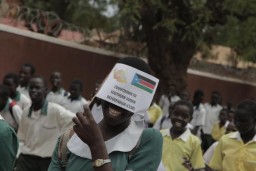
-
United States Senator William Proxmire
PhotoWilliam Proxmire (1915–2005) served in the United States Senate for the state of Wisconsin from 1957 to 1989. Senator Proxmire was one of the strongest advocates for the UN Convention on the Prevention and Punishment of Genocide, which was ratified by the United States in 1988.
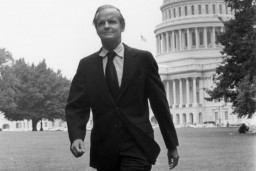
-
German publication on multiracial children in the Rhineland
PhotoImages from a German publication about the occupation of the Rhineland (1918–1930), a region in western Germany, and multiracial children who were born to white German mothers and Black soldiers there. Publication dated 1936–1939.
